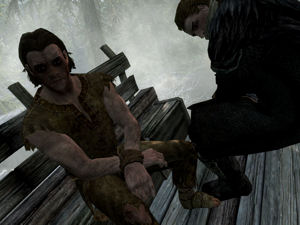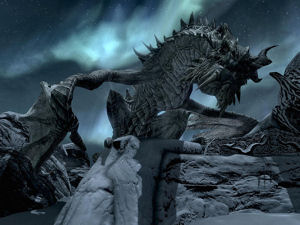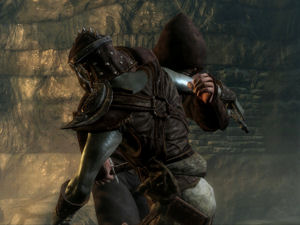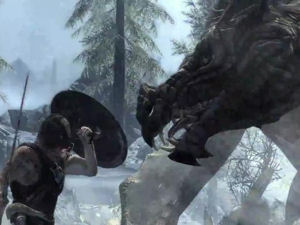Solo Gamer Review: The Elder Scrolls V: Skyrim
I'm sure, if you've spent any amount of time online recently, you've run into the memes and the constant references, even if you didn't know what they were. The Elder Scrolls V: Skyrim is more than just a video game; it's a genuine cultural phenomenon among gamers. As a solo gamer, I couldn't be more happy about that, because even though it could easily be turned into an MMO, The Elder Scrolls remains a dedicated one-player experience. The question, following the immensely successful Oblivion, is not whether or not Skyrim is great; it is merely a question of how great. Having logged well over 150 hours, I think I'm finally qualified to offer my opinion, so put some armor on your knee and let's get to it.
STORY
 | | At some point, they're going to realize all their heroes are convicted criminals |
Like previous entries in the series, Skyrim features a single main storyline supplemented by a handful of guild questlines, daedric quests, side quests, and hundreds of mini-objectives. The main storyline deals with the reappearance of dragons in Cyrodiil, which represents the final prediction of the game's namesake scrolls and is said to be the harbinger of the end of all things. After escaping your own execution during the first dragon attack by Alduin, the World-Eater, you quickly learn that you are something known as a "Dragonborn" (or "Dovahkiin" in dragon language), a mortal of noble blood who can absorb the souls of fallen dragons and master their skills--shouts--to use against them. According to prophecy, only a Dragonborn such as yourself can stop Alduin and save the world.
It's a decent fantasy yarn that mixes genre clichés and some minor plot twists, but the genius of an Elder Scrolls game is not the narrative per se; it's the potential to carve your own path through it. Skyrim has more variability than ever before, helped in large part by a backdrop of civil war throughout the Nordic region of Skyrim. It is made clear to you right at the start that the High King of Skyrim was recently killed by Ulfric Stormcloak over a disagreement over whether Skyrim should be ruled by independant Nord leaders (Jarls) or whether they should be subject to the laws and edicts of the Empire. You are free to choose sides (though the game does little to convince you that the Empire is worth protecting), and you can help to capture enemy strongholds and towns. This questline is relatively straightforward--report to a commander near the city or fort you are going to attack and then attack it--but it can also be pretty intense and exciting.
What's more, what you do in regards to the war has many consequences within the game world. Every city or town is under the control of either the Imperials or the Stormcloaks, and when you help to capture one (or liberate it, depending on your point of view), the town guard and its Jarl will change. While this seems like a dramatic shift that should interfere with certain quests-in-progress, in actuality, it's nothing more than a change of set dressing. Buildings won't be destroyed, no matter how flammable they seem during battle, shops won't close down, a change in leadership won't fail missions for that leadership, etc. You can even talk to the townsfolk about the change, but they will almost always offer a variation on the theme that it doesn't make any real difference. On one hand, this feels like a disappointing missed opportunity for the game to chart some bold interactive possibilities, but on the other, if the war caused permanent changes, players would never go into it for fear of interfering with their other quests.
 | | Did I mention the dragons? |
Having said that, there is a point late in the main storyline in which the state of the civil war comes into play and you, as the Dragonborn, can take part in diplomatic negotiations. I've only played through this part of the game once, but I am eager to see how it is affected by your allegiances and whether or not you have gone all the way through the civil war questline. This particular moment highlights one of the game's strong suits, in that it demonstrates that the designers are meticulous in keeping track of dozens upon dozens of variables at once. It may seem minor at first, but when you consider something like the game's incidental dialogue, which is specific to the player's chosen race, gender, allegiances, strengths, progress through multiple questlines, and even what's in his or her inventory, you start to realize that every single line probably needed to be recorded multiple times.
Still, the main questlines all follow the same plotpoints. Some questlines, like that of Skyrim's version of the Fighters Guild, the Companions, are relatively short and not terribly compelling, but other questlines, like that of the Thieves Guild (my personal favorite), are meaty and surprising. Disappointingly, though, each of the guild quests follows the same pattern: the guild is in decline and only you can help weed out the problems and restore the guild to its former glory. Every quest, including the main one, has its share of memorable moments, so despite plots that aren't entirely original, the stories are fun and rewarding to work through.
|
[STORY: 8.5 - The plots are fantasy clichés and there aren't any real consequences to your choices, but occasional sparks of brilliance and the sheer scope of the universe make for a compelling experience in which the best story is the one you craft yourself.]
|
|
GAMEPLAY
 | | Finishing moves are pretty awesome |
The combat system works well and responds quickly. Whether you're sniping with a bow and arrow, swatting baddies down with a warhammer, or burning people alive with your magic, you will always feel in control of your actions. The ability to dual weild and mix and match makes for a great deal of customization, and the addition of a quick radial menu that you can fill with your favorites allows you to switch things up on the fly, though it does pause the action when you do so. On top of that, there is the addition of the shout, a new one-button ability that complements your arsenal with surprising variety. Finishing moves and a polished third person perspective don't change the fact, however, that every encounter will feel largely the same.
You will kill a lot of skeevers, bandits, necromancers, and draugrs, and their general attack patterns are all the same. You don't really have to modify your approach to fit different enemies, and it won't be long before hacking away at your enemies gets boring and monotonous. Even boss fights are relatively standard affairs. When your enemies all do the same thing--namely, come at you relentlessly--and there are few ways to use your environment beyond hiding in the shadows, it doesn't leave a lot of room for creativity or unique battles. The only way to switch things up is to alter your own approach, but the leveling system, which rewards repeated use of the same skills, discourages you from trying new things.
The exception to all this, of course, is in epic confrontations with dragons. There are a handful of scripted dragon fights in the main storyline and a few dragons waiting at specific locations on your map, but most of the dragons you will face in Skyrim will come from random encounters. Dragons are large, fierce beasts that can be challenging to bring down if you don't know what you're doing. If your difficulty isn't set too low and you haven't leveled up to become an unstoppable badass, dragon fights can be the most intense parts of the game, forcing you to rely on multiple skills and methods. Granted, even these fights can get tedious after you've killed thirty or so dragons, but they never get as boring as your seven-hundredth confrontation with a cave bear.
 | | How to Train Your Dragons this ain't |
The strength in the gameplay is in the brilliant leveling system, which rewards you with surprisingly useful perks as you level up. The need to get just one more perk will keep most players going long after the game has worn out its novelty, and when you finally get certain abilities like paralyzing arrows, shield bashes that knock enemies over, or the ability to invest in merchant shops, you will find that the game continues to surprise you. Combat and dungeon crawling may have gotten old for me at the hundred hour mark, but I'm still playing after one hundred fifty hours because I'm still enjoying getting new perks that open up whole new possibilities within the game.
The leveling is not without its weaknesses, however. Due to the facts that any skill can be used to level up and that the enemies level up alongside you, if you don't customize your abilities enough, the game can get pretty difficult pretty suddenly. There is a certain sour spot--right around level ten or so--when you haven't gotten great at any one combat ability but have managed to level up some less combat-intensive skills like speech, enchanting, smithing, or alchemy, when the combat can go from relatively easy to downright impossible at the drop of a hat. In one of my playthroughs, I remember being at level nine and being able to drop multiple groups of bandits at once, but then, when I leveled up to level ten, I came across a single orc with a warhammer and had to drop the difficulty to "novice" in order to scrape by with my life. I had similar experiences in my other playthroughs. Then, when you've reached level forty or so, you'll be so powerful that you could put the difficulty on "master" and still breeze through the game without a care in the world. I like being able to change the difficulty whenever I want, but even with that feature, the game's overall difficulty never seems properly calibrated or well-balanced.
|
[GAMEPLAY: 9.0 - The controls are excellent and intuitive, but the combat gets stale easily and the game's difficulty is uneven.]
|
|
-e. magill 1/17/2012
|
|